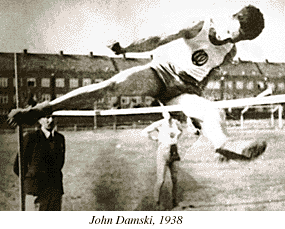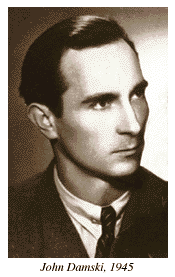
John Damski was born in Germany in 1914 to Polish parents. Four years later, after World War One, his parents returned to newly independent Poland to raise John, his two brothers and sister. Growing up, John excelled in sports, especially track and field, and soccer; he once placed second in the Polish national championship triple jump event. When World War Two broke out in 1939, John was serving in the Polish army, in the Battalion for the Defense of the Seashore, at Gdynia, on the Baltic coast.

All three brothers belonged to our gymnastic organization, the Polish Falcons. We called our local organization "the nest." There was also a district level, and so on, up to the national level. One day a fellow from the district organization came to our meeting and made a fuss about Jews being in our group. The oldest of the three Dalman brothers stood up and told him that the Jews were just as patriotic as the Poles, they had fought for Poland too, and other such sentiments. It didn't take very long before the local organization just fell apart. First, all the teachers from our little town who belonged to this club resigned. They didn't say it was in protest--they were just no longer interested. My brother and I dropped out of the organization, and so did many of our friends; half of the membership resigned. Nobody said, "I'm quitting because the district officer made an anti-Semitic speech." We just didn't like what was happening; we simply did not see any difference between us and the Jews.
My next encounter with Jews was in 1935, one year before the Olympic Games in Berlin. I was in the state training camp, but I wasn't quite good enough to be chosen for the Olympic team. A fellow named Israelowicz, the state champion in the 100 meter run, was also in our camp. He was the first Jew to really show me what anti-Semitism was all about. One day as we were walking down the street, we stopped to look at a poster of Joan Crawford; it was advertising travel to the United States.
"Look at that," Israelowicz said. "They ask us to travel, but they won't let us go."
He told me how he couldn't just go to the foreign ministry, like I or anyone else could, and get a passport. That's when my eyes were first opened to the difficulties of the Jews--that they were being treated differently. But then, as a young fellow, you think to yourself, who cares? You live in your own little world.
When I was already a grown man living in Gdynia, my third encounter with Jews took place. One evening I ran into an old school pal and his girlfriend in a nightclub. We were sitting there having a few drinks, when all of a sudden she said, "Take a look! Those are Jews over there! To hell with the Jews!" I was so ashamed--my brother and I knew those Jewish girls. My friend slapped her face, and we left the club. That someone could say a thing like that in public showed me how ignorant people could be. Sure, we saw the signs posted everywhere saying "Don't Buy From a Jew." People were still doing business with the Jews, but no one took the signs down, and we didn't protest.
Prisoner of War: On September 1, 1939, the Germans invaded, and being in the army, I was taken prisoner of war. On the way to the prisoner of war camp I managed to escape. It was not such a big deal--escaping at night was easy. I returned to Gdynia, and took a job working for the power and water company. One day some Germans came around and said that since I was born in Germany and spoke German almost as well as Polish, I should declare myself a German national. I said no, I would never do it. I was not a German; it was as simple as that.
 They kicked me out. I got a paper saying I had to leave town within twenty-four hours. This happened to most of the Polish people in that area. The Germans resettled all the Poles to the area they named the
General Gouvernement,
under the jurisdiction of the famous Nazi, Hans Frank.
They kicked me out. I got a paper saying I had to leave town within twenty-four hours. This happened to most of the Polish people in that area. The Germans resettled all the Poles to the area they named the
General Gouvernement,
under the jurisdiction of the famous Nazi, Hans Frank.
It was early in December, 1939. Two friends and I decided to try to get to Hungary, and eventually France. On December 9th we were close to the Hungarian border when German soldiers caught us, and delivered us to the Gestapo. They made us undress completely. As we stood naked against the wall, the Gestapo made all kinds of insinuating remarks, threatening to shoot us. Then they sent us to a jail at Sanok near the Ukraine, for "preventative," that is, political prisoners--mostly doctors, lawyers, professional people--three hundred forty-five men altogether. The conditions were dreadful. We had forty-five guys in a cell meant for seven or eight; there was so little room, we could only sleep on our sides. The toilet was a single bucket in the cell. We were never allowed to go out. Fleas, flies--whatever you want--they were all there.
On the night of June 13th--it must have been three or four o'clock in the morning--we heard big trucks come into the prison yard. I looked through the window--just peeked--because we were not allowed to look out. The sky was still gray. I saw two S.S. men walking in the yard with rifles on their shoulders. One stopped and kicked what I think must have been a dead mouse, and said, "One is already dead." It gave me a shiver. Then I saw them load prisoners on the trucks. All night long the trucks kept coming back and taking more out again. It went on until seven or eight in the morning.
Right away we got the news about what was happening. Each truck had five or six benches. They put one prisoner on a bench and an S.S. man with a gun next to him to guard him--maybe six prisoners in one truck--they were not packed in. Before loading them into the trucks, they had cut the buttons off of the prisoners' trousers, so that they had to hold up their pants with their hands. There was no possiblility of escape. The trucks stopped on the outskirts of town, and they killed them. They killed one hundred fifteen men that night--one third of the prison's inmates. We were told that the rest of us would go the next night.
When we realized that we all faced death, there wasn't much to say. Most of us were praying. No matter how brave or how atheistic we were, when we came to face death, almost everybody started to pray. But it didn't happen. At three or four o'clock in the afternoon the trucks and the S.S. unit that was killing us suddenly left.
A short time later, they sent the remaining prisoners to Auschwitz, but for some reason I was not among them; I stayed on in that prison. One day an S.S. man came to my cell.
"Something's wrong. I don't seem to have any record of you."
He started asking me questions. How did I get there? I told him a little lie, that I was arrested at the local railroad station. What was I doing in this town? I said I was looking for a job in the battery factory--it was somewhat related to my trade as an electrician. I thought this up on the spur of the moment.
He didn't believe me. For two hours he interrogated me. I told him that my mother spoke German because she had attended school in Germany, and that I felt as if I was a German.
"Oh, so now you feel like a German?"
"Well, do you know any Poles who speak German as well as I do?"
I used a German expression that means "my mother tongue," and that impressed him.
"O.K. I'll let you out," he said. "But I want you out of this town immediately."
After the interrogation I was waiting to go back to my cell, holding my arm behind my back. A female warden passing by stuck something in my hand. Not wanting to call attention to myself by raising my hand, I didn't look. Later I saw that it was five zloty--about five dollars--enough to have a good meal.